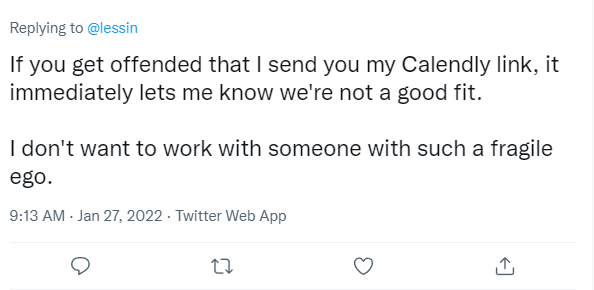Sharing your Scheduling Links – Politely

Online meeting scheduling has become commonplace. A couple of years ago (pre-pandemic), there were still a lot of holdouts who preferred the “personal” touch of interacting directly with clients or enjoyed a high flow of walk-ins. Covid stopped that. Now everyone makes appointments online. However, some people find it impersonal and even rude to receive meeting scheduling links instead of engaging in a back and forth dialogue. It’s almost as if the business relationship starts with negotiating a meeting time.
And you know what?
It does.
Why the Sudden Controversy about Scheduling Links?
At the end of January, there was a Tweet and a screengrab from Sam Lessin (former VP of Product Management at Facebook) about the social power dynamics involved in sending scheduling links. The Tweet specified Calendly, but the theme included any meeting scheduler or appointment booking system that can be sent via a link.
“Calendly etiquette is the most raw/naked display of social capital dynamic in business.”
Sam Lessin
It’s a forthright statement that implies nothing of the nuance and the method of approach. It could have been a monumentally damaging take on the general sharing of meeting links and scheduling systems. However, thankfully, the response to this tweet was overwhelmingly pro scheduling links from both sides, senders and recipients.
However, enough people agreed with the original post to give us pause to think about the way we share scheduling links.
Another disturbing statement in Mr Lessin’s tirade against scheduling link sharing means that a few people genuinely believe a power play is involved.
“However, here’s the thing – in practise, I will never click on your Calendly… ever (unless maybe you’re the president of the US).”
Sam Lessin
Start your Business Relationship with the Right Approach.
When you start a client relationship, the last thing you want to do is to seem rude or disinterested. You don’t want to make your clients think that every other appointment in your calendar is more important than them.
Okay, some are more important, but that’s no way to make clients feel right at the beginning of your interaction.
If you don’t frame your first impression correctly, the clients will find another company. Even if you are the best in the region, some clients will still look for a company that will make them feel important over one that makes them feel irrelevant. First impressions count.
So if your first step in your business relationships is to send calendar scheduling links, you want to ensure you’re not rude and frame it in the most polite way possible.
The Etiquette of Sharing Scheduling Links
There is a style and a flair to sharing scheduling links without seeming pushy, rude or disinterested. While getting your prospective client to schedule a meeting with you might be your preferred method of scheduling meetings, please don’t make your clients believe it is the only way to get your attention. It’s a surefire way to make them feel undervalued – and no one likes to feel like that.
When to send scheduling links
When you’re at the point of sending a scheduling link to the client, you have probably already had some interaction with them, probably via email or a messaging app.
If you have a website with a booking page where people are encouraged to make an appointment with you, you don’t need to send a booking link because that is already part of your initial contact process. When people contact you outside of this framework, it is pretty apparent they want more personalised contact with you. Perhaps they want more information before committing to booking an appointment.
Conversely, if your initial dealings with a potential client come from an informal phone call or email exchange, sending a scheduling link can enable you to find mutually agreeable times for a more formal meeting. Perhaps even a face-to-face meeting or one requiring multiple attendees.
How to Phrase your Scheduling Link Offer
Part of the initial problem with these easily offended people receiving scheduling links is the mode of address. Perhaps it does seem like EVERY other appointment already booked is more important than them.
“When someone sends you a Calendly link and asks you to slot yourself on their calendar, they are telling you that you are less important than them / and that ALL of their current meetings are ‘more important’ than whatever you need them for – it’s a ‘get in line’ move.”
Sam Lessin
While most people don’t feel this way, common sense dictates that you phrase an invitation to book a time in your calendar as politely as possible. Most people are happy to use scheduling links to find a quick and simple time for a meeting. Why would you switch a simple process for booking a meeting when you could send a dozen or more emails debating available times. Then potentially having to reschedule because someone forgot about the different time zones – which the meeting link can often accommodate.
The artistry comes in the way you send your link.
Some examples:
Good afternoon [Sir/Madam],
Please use the link to find a convenient spot on my calendar.
[Scheduling link]
Regards
This is not a polite way to invite someone to book a meeting on your calendar. It indicates that your time is far more important than theirs, and they should adjust to fit your schedule. That’s not the feeling you want to convey for the best start to a business relationship.
Good afternoon [Sir/Madam],
Please send me some times that work for you, and I will schedule a meeting time that works for both of us. Alternatively, you can find time on my calendar [Scheduling link] if it’s easier.
Kindest Regards
This type of message invites the client to make a suggested meeting time themselves and invites them to use the scheduling link for convenience. This might be more time consuming than demanding they use the scheduling link but ultimately more inclusive when most of your correspondents will use the link.
Alternatively;
Good afternoon [Sir/Madam],
Please see if you can find a mutually agreeable time on my calendar [Scheduling link]. However, if you can’t find an appropriate slot, don’t hesitate to contact me with your preferred availability, and we can schedule a time that works for you.
Kindest Regards
While initially, you ask them to use the calendar scheduling links, you also give them the chance to make an appointment with their availability.
Both options put the power of scheduling a meeting in their hands. They can opt for convenience and using the link, but they also have the opportunity to make alternative suggestions.
“Reading the Room” – A judgement call
If you are close to setting up a particular meeting type with a new or existing client, you should try to read the relationship. You can usually tell when the client would be receptive to a meeting link and when they would not.
If you suspect that your client might not be receptive to a scheduling link, you can still send a polite message with your scheduling link, even if you don’t think they will use it. If they have an assistant that manages their calendar, they will probably appreciate it.
Filtering Clients By Their Attitude
A common theme emerged in the Twitter thread of the original post. Do we really want to work with the people who read so much social dominance into a scheduling link? The overall thought was “no!”.
While some of these easily clients might be big wins, they could be the most demanding, challenging and trying clients—possibly more trouble than they are worth.

One of several responses in the Twitter feed that indicates an unwillingness to work with difficult and egocentric clients. Offense taken to scheduling links is a red flag in indicating whether a client is worth the effort. In almost every business model, you want to be in a position where you can choose whether you want to work with particular clients. It is possible for clients as well as companies to be blacklisted because of unreasonable demands and challenging business relationships.
Scheduling Links Save Time
Scheduling links save everyone time. It is the entire point of creating the online meeting scheduler. For the most part 90% of people appreciate the convenience of scheduling links for setting meetings and appointments because it saves a monumental amount of time used for back and forth emails. No one appreciates those.
Admittedly, a scheduling link is not the most personal approach to a client. However, saving time allows you to be more present when you do have meetings scheduled. It is a trade that gives you more time and opportunity to be fully focused on your scheduled clients.
However, if you really want to accommodate the remaining 10%, let them feel they have the option to suggest their preferred meeting time. If they’re one of the “I’ll never open your scheduling link”, they’ll never know if you scheduled them into an available calendar slot.
Most of the time, it seems polite to allows clients free reign to select an available slot on your calendar. However, some people prefer the dance of negotiated availability. If anything is a power play, it’s the need to prove who’s more important by who has to make mare accommodations.
You don’t need to stop sending scheduling links to your clients. Yet, keeping options open will smooth the journey to a mutually agreeable meeting time.



Comments
0 commentsNo comments yet